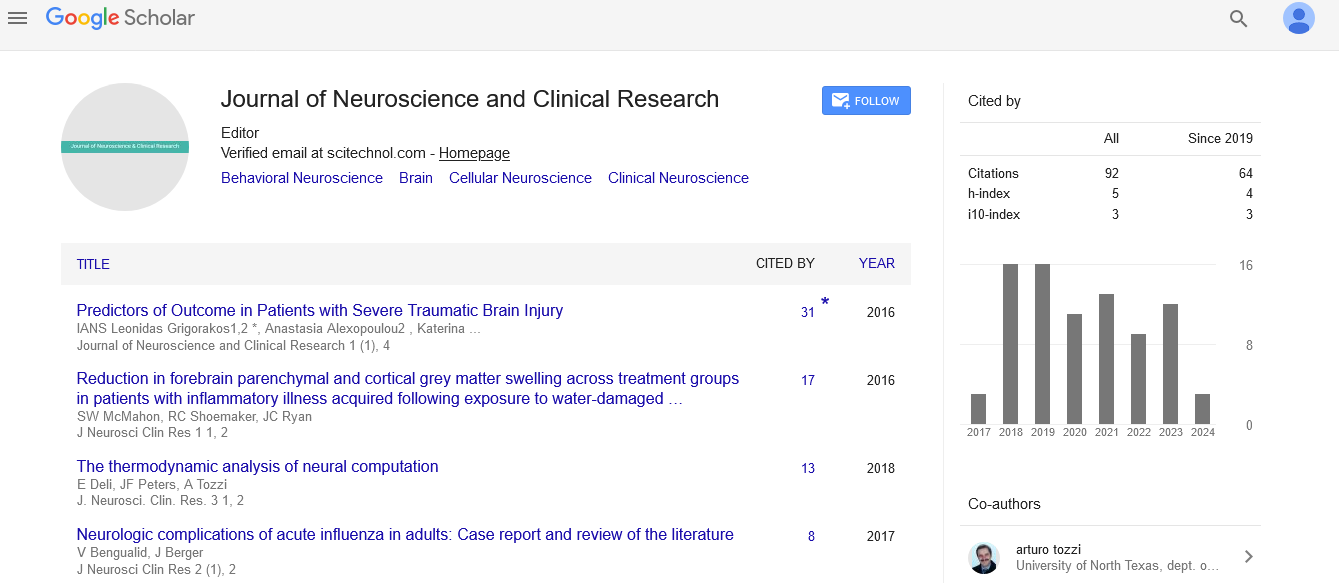Opinion Article, J Neurosci Clin Res Vol: 9 Issue: 1
Disrupted Connections: Neurological Functional Disorders Unveiled
Aolong Chen*
1Department of Neurology and Neurosurgery, McGill University, Montréal, Canada
*Corresponding Author: Aolong Chen,
Department of Neurology and Neurosurgery,
McGill University, Montréal, Canada
E-mail: cenaolong@gmail.com
Received date: 26 February, 2024, Manuscript No. JNSCR-24-131648;
Editor assigned date: 28 February, 2024, Pre-QC No. JNSCR-24-131648 (PQ);
Reviewed date: 14 March, 2024, QC No. JNSCR-24-131648;
Revised date: 21 March, 2024, Manuscript No. JNSCR-24-131648 (R);
Published date: 28 March, 2024, DOI: 10.4172/Jnscr.1000182
Citation: Chen A (2024) Disrupted Connections: Neurological Functional Disorders Unveiled. J Neurosci Clin Res 9:1.
Abstract
In the intricate network of the human brain, the seamless flow of signals between neurons orchestrates the symphony of thoughts, sensations, and movements that define our daily lives. However, for individuals with neurological functional disorders, this intricate dance of neural communication is disrupted, leading to a myriad of symptoms that can profoundly impact quality of life. In this article, we delve into the world of neurological functional disorders, uncovering the underlying mechanisms, exploring the challenges of diagnosis and treatment, and shedding light on the experiences of those affected.
Description
In the intricate network of the human brain, the seamless flow of signals between neurons orchestrates the symphony of thoughts, sensations, and movements that define our daily lives. However, for individuals with neurological functional disorders, this intricate dance of neural communication is disrupted, leading to a myriad of symptoms that can profoundly impact quality of life. In this article, we delve into the world of neurological functional disorders, uncovering the underlying mechanisms, exploring the challenges of diagnosis and treatment, and shedding light on the experiences of those affected.
Neurological functional disorders, also known as Functional Neurological Disorders (FNDs) or conversion disorders, encompass a broad spectrum of conditions characterized by neurological symptoms that cannot be attributed to a structural or known neurological disorder. These symptoms may manifest as disturbances in movement, sensation, or cognition, often with no discernible underlying pathology detectable through traditional neurological examinations or imaging studies. Despite their prevalence and significant impact on individuals and healthcare systems, neurological functional disorders remain poorly understood and frequently misdiagnosed. The absence of identifiable structural abnormalities on neuroimaging or diagnostic tests often leads to skepticism and stigma, compounding the challenges faced by those affected.
While the exact mechanisms underlying neurological functional disorders remain elusive, emerging evidence suggests that disruptions in neural circuits and altered patterns of brain activity may play a key role in their pathophysiology. Functional neuroimaging studies have revealed aberrant patterns of brain activation and connectivity in individuals with FNDs, implicating dysfunction in regions involved in motor control, emotion regulation, and sensory processing. Moreover, psychological factors such as stress, trauma, and emotional distress are thought to contribute to the development and exacerbation of symptoms in neurological functional disorders. The brain's intricate interplay with the mind underscores the complex interaction between psychological and neurological factors in shaping the manifestation of symptoms.
Diagnosing and treating neurological functional disorders present unique challenges for healthcare providers. The heterogeneous nature of symptoms, variability in presentation, and lack of objective biomarkers make accurate diagnosis and classification difficult. Additionally, the stigma surrounding functional disorders can hinder open communication between patients and healthcare providers, further complicating the diagnostic process.
Treatment approaches for neurological functional disorders typically involve a multidisciplinary approach, integrating medical, psychological, and rehabilitative interventions. Cognitive-Behavioral Therapy (CBT), mindfulness-based therapies, and physical rehabilitation programs have shown promise in managing symptoms and improving functional outcomes for individuals with FNDs. However, the effectiveness of treatment varies widely among individuals, highlighting the need for personalized, patient-centered approaches. Central to the management of neurological functional disorders is empowering patients with knowledge, support, and validation of their experiences. Educating healthcare providers, patients, and the public about the nature of functional disorders and destigmatizing misconceptions are essential steps in fostering understanding and empathy. Furthermore, ongoing research efforts aimed at unraveling the neurobiological mechanisms underlying FNDs hold promise for developing targeted interventions and improving outcomes for affected individuals. By advancing our understanding of the brain's complex interplay with psychological and environmental factors, we can pave the way for more effective treatments and ultimately enhance the quality of life for those living with neurological functional disorders.
Conclusion
Neurological functional disorders represent a complex and often misunderstood category of conditions that challenge our conventional understanding of neurological disease. By recognizing the disrupted connections within the brain and the intricate interplay between psychological and neurological factors, we can begin to unravel the mysteries of these enigmatic disorders. Through collaborative research, compassionate care, and public awareness initiatives, we can strive to alleviate the burden of neurological functional disorders and improve the lives of individuals affected by these conditions.
 Spanish
Spanish  Chinese
Chinese  Russian
Russian  German
German  French
French  Japanese
Japanese  Portuguese
Portuguese  Hindi
Hindi 